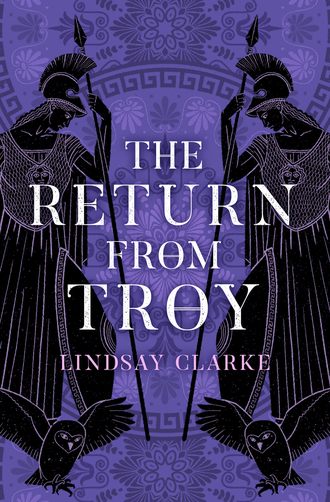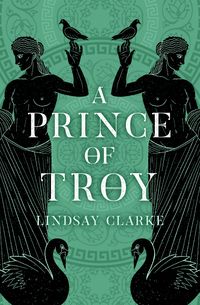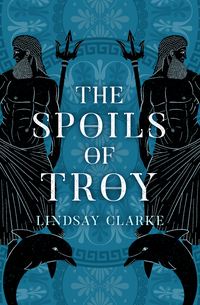
Полная версия
The Return from Troy
Taking stock of the menace in their faces, Antinous glanced for support to Eurymachus who released Telemachus and stood uncertainly beside his friend with the ridiculous phallus knocked askew at his waist. Sensing that neither Eurymachus nor Leodes had the stomach for a fight, Antinous gasped, ‘What’s the matter with the brat? Can’t he take a joke?’
‘There’s jokes and there’s jokes,’ said the grizzled old shepherd with the crook, ‘and if you think that one was funny then you’ll be even more amused when this ash-plant comes down across your ear – which it would have done by now if I wasn’t making allowances for the belly-load of wine you’re carrying.’ Then he turned to Telemachus. ‘And you’d better run along, young sir. If your father was home, he’d tell you that it’s wise to pick a fight only when the odds are with you.’
Flustered and abashed, Telemachus turned on his heel, shouting, ‘If my father doesn’t kill you when he gets back, Antinous, I promise I’ll do it myself.’
‘Wake up, donzel!’ Antinous shouted after him. ‘Your father’s not coming back, and you’re going to have to answer for those words one day.’
Peiraeus told me that the shepherds would certainly have beaten Antinous in that moment had not Eurymachus had the good sense to hustle him away.
When I learned what had happened, I set out to look for Telemachus. Last seen heading for the palace, he wasn’t to be found in his chamber and no one in the hall knew where he was. By now darkness had fallen, so there was no point wandering the hillsides in search of him, and I was about to give up and join Penelope and the others in the hall when I heard voices in Eurycleia’s chamber.
Putting my ear to the door, I heard the hoarse croak of the old nurse’s voice reassuring Telemachus that he was just like his father – too proud and too brave not to put himself at risk. ‘He was about your age when he went hunting boar with his grandfather Autolycus in the woods around Mount Parnassus,’ she was saying, ‘Couldn’t wait for the huntsmen to lay the nets – not him. Couldn’t wait for the boar to come rushing at him neither. He has to leap straight at it with his spear, leaving his grandsire standing aghast behind him. He got his boar sure enough, but not before the great beast gored his thigh. He took such a gash that men wondered whether he’d ever walk straight again, which he did of course, though he bears the scar of it about him still. He was too proud for patience, you see – just like you – though he learned more sense in later years.’
I was about to walk away and leave them to it when I heard the shaky voice of Telemachus protest, ‘But I’ve been patient. I’ve waited patiently for years and years and it feels like he’s never coming back. I think he must be dead.’
‘He’s no deader than I am,’ Eurycleia said. ‘He’s far too good a sailor to get wrecked by any storm, if that’s what you’re thinking. And he’s too crafty to be kept down for long by any villains who may cross him. Believe you me, my boy, your father’s the rarest of men. The gods have a care for a man like that.’
‘Then why hasn’t he come back?’
‘I don’t know,’ Eurycleia answered, a little flustered now. ‘Perhaps the fancy’s taken him to go adventuring again. I wouldn’t put it past him. Perhaps he’s taken the Black Sea passage like Jason before him and come up against the Clashing Rocks, or got himself enchanted by the Sirens’ song, or hasn’t yet found the narrow way between Scylla and Charybdis. He always loved those old stories. He loved them just as much as you do. Perhaps he’s gone to find out if there’s any truth to them, and when he comes home he’ll bring back something magical and splendid like the Golden Fleece. That’s just the kind of thing Odysseus would do if he took a mind to it.’
I don’t know what effect this fanciful gesture of consolation had on the mind of Telemachus but Eurycleia’s words ignited my own imagination. I began to see how my Lay of Lord Odysseus might be embellished by motifs from those stories. I imagined his ship picking its way through the blue ice floes that came drifting across its bows out of the freezing fog of the Black Sea. I knew that if there was any chance of hearing the Sirens’ song, then Odysseus would want to hear it. Like Jason, he would have himself strapped to the mast with cables while his crew rowed past the enchanted island with their ears stopped up with wax. With my mind already racing, I persuaded myself that if anyone could steer a ship between the many-headed monster Scylla, keeping watch from her cave on the cliff, and the fearful whirlpool of Charybdis, then Odysseus certainly could. So I hurried away down the passage with the song of the Sirens thrilling through my mind, and when I went to bed I lay there yearning for the day when my lay was done and I would be crowned with laurels as the greatest of all bards.
Then, in the small hours, I was jolted back to my senses by the miserable thought that all those songs had already been written. Everybody knew them. Those marvellous adventures belonged to the story of Jason: anywhere outside Ithaca, I would be laughed out of court if I tried to claim them for Odysseus.
Yet my mind would not rest and, before dawn broke, another thought struck me. There was a story belonging to our island that might still be turned into a noble song. It was a crude enough tale of the encounter between our ancient folk hero Oulixos and a one-eyed cannibal giant that devoured some of his men when they landed on his island. Trapped in the giant’s cave, Oulixos and his men blinded the Cyclops and made their escape. But wasn’t it possible that on his voyage home Odysseus had chanced on that same island? With all his resourcefulness, surely he would think up some ingenious way of outwitting that dull monster?
And so it was that, because I heard an old nurse comforting my friend with stories, I conceived the first lines of a song that would not be completed till after Odysseus’ return and is sung across Argos by bards who claim it for their own. As is well-known, the song tells how Odysseus and his men escaped from the island of the Cyclopes by fooling Polyphemus into the belief that a man called ‘Nobody’ had put out his eye. But with Odysseus now long dead, I feel free to tell how there was once a time when his strong sense of identity was so reduced by his ordeals that Odysseus truly believed that he had become Nobody indeed.
Nobodysseus
The sight of their leader collapsed and weeping in the arms of Guneus shocked the crew of The Fair Return into a state of dumb bewilderment. This was Odysseus, their lord and captain, the most endlessly resourceful of men and among the most eloquent. What news could be so bad as to wreck him like this?
And Guneus himself scarcely knew what to say or do in that moment because the whole weight of Odysseus’ upper body had slumped against his chest as if all the power had drained from his legs and he was left with strength only to gasp and shudder as he wept.
‘I meant no harm,’ Guneus heard himself saying after a time. ‘The gods are just, Odysseus. I’m sure all will be well.’ But Odysseus had passed beyond reach, beyond hearing and each word was of small account against the force of the blizzard gathering inside his mind. The tears running down his face and the sobs shaking his body were no longer marks of grief or loss or any other emotion with a known name: simply the outward signs of a suddenly accelerated process of dissolution over which he had no control, and which was as impersonal in its power as a flash-flood crashing through a forest and on into the chambers of a well-built house.
Guneus turned his head towards the dumbstruck men along the beach and shouted, ‘Give me a hand here, someone. This man needs help.’ Then Baius came running, and Demonax, and Eurybates who now wore a vermilion cloth wrapped about his wounded temple in the Libyan fashion. But Odysseus fended them all off as though they were Furies coming at him like bats out of the dark. He pushed Guneus away, staggered in the sand, and stood swaying with his head in his hands and the sobs juddering through him and a hoarse, protracted noise, like the creaking of a door, breaking from his mouth.
Eurymachus came up alongside Guneus, demanding to know what was happening and was astounded to see Odysseus stare at him with a grimace of horror across his face, almost as though he was covered in blood, before turning away and making for his lodge with one hand still pressed to his head.
‘What happened between you?’ Eurylochus demanded of the armoured man across from him, who was tugging in puzzlement at his beard. ‘What did you say to him?’
Guneus opened his hands as if to demonstrate his harmlessness. ‘I just told him what’s been happening at home. The news isn’t good. It’s given him a shock, I’m afraid. He’ll be all right again when he gets over it.’
Yet the man’s voice lacked the confidence of the opinion, and as the hours passed, the condition of Odysseus deteriorated further. He sat inside his lodge, rocking backwards and forwards, groaning and holding his head, and would accept no comfort from anyone – not the women who were used to serving him, nor from any of the friends who approached him. He either stared at them aghast without responding or snarled like an injured dog, demanding that they let him be. They muttered together outside the lodge, all of them dismayed by what they too had now learned of events back home in Ithaca and across all Argos, yet still unable to comprehend why Odysseus had been so unmanned by the news.
Arguments broke out as to what best should be done to help him, and the situation became further confused when Guneus decided that he had no wish to see his own crew contaminated by the febrile atmosphere of this camp. There were a couple of hours of light left in the day and he decided to use them to make progress towards the mouth of the river Cinyps rather than allowing his crew to sink into a stupor with this demoralised bunch of Ithacans. Not all his men were happy at being ordered back to sea but he forced his will on them, and climbed aboard his ship shouting to the Ithacans watching from the shore that if any of them were of the mind to shape up, he could always use good men.
Glaucus, captain of the Nereid, and Demonax of the Swordfish glanced uneasily at one another as they watched the Thessalian pentekonter pull out into the bay.
A rosy glow of sunlight glanced off her sail as it billowed from the yard. The oars were shipped, spindrift scattered from the prow, and a white wake glistened behind the vessel as she scudded westwards on the breeze. For the landlocked Ithacans it was like watching their own lives recede.
Some time after the sun had gone down Eurylochus decided to try to speak to his leader again. A good sailor, cautious and pragmatic, always with a keen eye for the run of the weather, he was never gifted with the sharpest of wits but had a feeling heart and could not bear to think of his old friend lying wretchedly alone. Prepared for a further angry dismissal, he went into the lodge with an oil-lamp in one hand and a bowl of food in the other, and found his captain lying on his bed in a dishevelled state.
‘I’ve brought you some food,’ he said gently. ‘You should try to eat something.’ When no answer came, he put down the lamp and bowl, stood uncertainly for a moment, then said, ‘It’s me – your old shipmate Eurylochus. You can talk to me.’
By the dim light of the lamp he saw Odysseus turn over on the bed. A haggard face looked up at him.
‘Eurylochus?’
‘That’s right, sir,’ the man answered, encouraged, ‘Eurylochus, as ever was.’ He took the hand that Odysseus reached out to him and felt the strength of its grip.
‘I keep seeing her,’ Odysseus said, ‘again and again. I can’t get my head clear.’
Eurylochus nodded his head in sympathy, certain now that he understood the cause of the man’s grief. ‘I’m sure you there’s no need to trouble your head over Penelope, lord. Your wife has always loved you and she always will. You’ve got nothing to fear there, whatever foul lies Guneus was spreading.’
But Odysseus frowned and shook his head. ‘No, it’s not her’ he said. ‘You don’t understand.’
Eurylochus furrowed his brow. ‘Then who, sir? Who do you see?’
Odysseus lifted his stricken face. ‘Polyxena,’ he whispered. ‘Even in the dark, she’s there, looking back at me.’
Bewildered by the response, Eurylochus said, ‘King Priam’s daughter, you mean? The one that young Neoptolemus took in vengeance for his father? She’s long dead and in the Land of Shades, lord. You don’t have to worry about her.’
Tightening his grip on his friend’s wrist, Odysseus said, ‘We never atoned for her. That’s why she won’t let me go. Don’t you see it? She was innocent and not one of us atoned for her death. We shan’t ever be free of her now, not unless …’
Swallowing, calling silently on the gods for protection, Eurylochus said, ‘Unless what, sir?’
‘The thing is, I keep seeing her – even when I close my eyes she’s there across from me. I see her baring her breasts on Achilles’ tomb, lifting her chin before the sword, defying us, knowing that she’ll always be there.’
‘But you didn’t kill her, lord,’ Eurylochus tried to reason with him. ‘If there’s still blood-guilt there, it’s none of yours. It lies with Neoptolemus.’
‘I should have prevented him. I knew what he was going to do and I should have stopped it. He was only a boy. A boy possessed by what he thought was his father’s shade. But he was too young. He should never have been at Troy. And neither should Achilles before him. And it was me who brought him there.’
Конец ознакомительного фрагмента.
Текст предоставлен ООО «ЛитРес».
Прочитайте эту книгу целиком, купив полную легальную версию на ЛитРес.
Безопасно оплатить книгу можно банковской картой Visa, MasterCard, Maestro, со счета мобильного телефона, с платежного терминала, в салоне МТС или Связной, через PayPal, WebMoney, Яндекс.Деньги, QIWI Кошелек, бонусными картами или другим удобным Вам способом.





